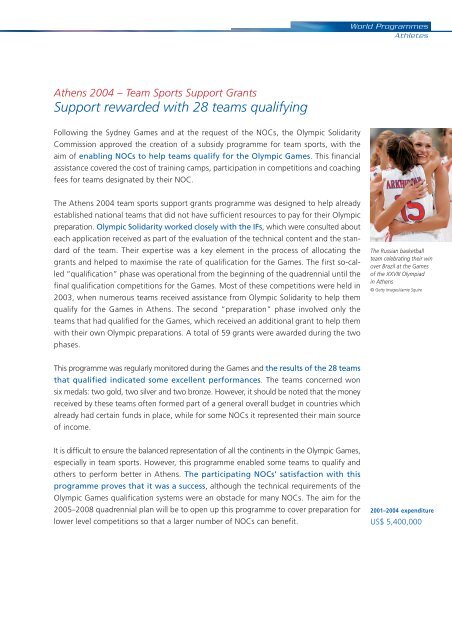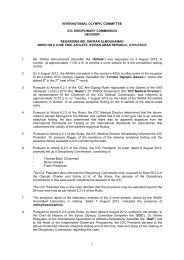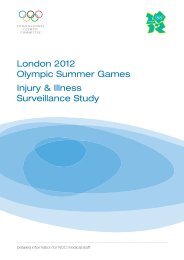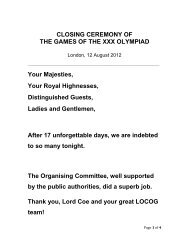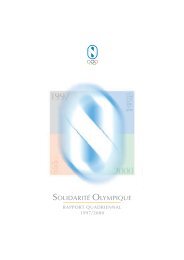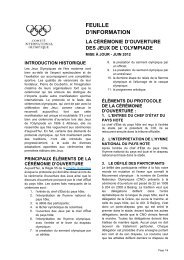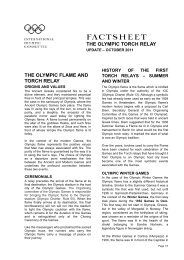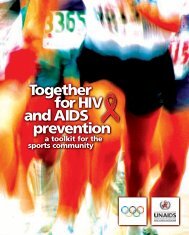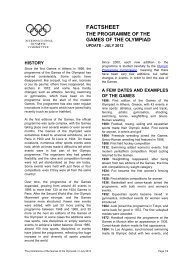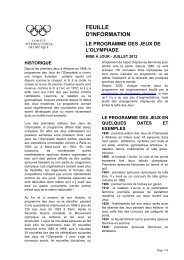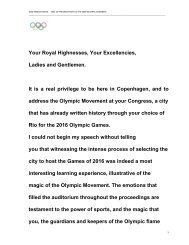Final Report
Final Report
Final Report
You also want an ePaper? Increase the reach of your titles
YUMPU automatically turns print PDFs into web optimized ePapers that Google loves.
Athens 2004 – Team Sports Support Grants<br />
Support rewarded with 28 teams qualifying<br />
Following the Sydney Games and at the request of the NOCs, the Olympic Solidarity<br />
Commission approved the creation of a subsidy programme for team sports, with the<br />
aim of enabling NOCs to help teams qualify for the Olympic Games. This financial<br />
assistance covered the cost of training camps, participation in competitions and coaching<br />
fees for teams designated by their NOC.<br />
The Athens 2004 team sports support grants programme was designed to help already<br />
established national teams that did not have sufficient resources to pay for their Olympic<br />
preparation. Olympic Solidarity worked closely with the IFs, which were consulted about<br />
each application received as part of the evaluation of the technical content and the standard<br />
of the team. Their expertise was a key element in the process of allocating the<br />
grants and helped to maximise the rate of qualification for the Games. The first so-called<br />
“qualification” phase was operational from the beginning of the quadrennial until the<br />
final qualification competitions for the Games. Most of these competitions were held in<br />
2003, when numerous teams received assistance from Olympic Solidarity to help them<br />
qualify for the Games in Athens. The second “preparation” phase involved only the<br />
teams that had qualified for the Games, which received an additional grant to help them<br />
with their own Olympic preparations. A total of 59 grants were awarded during the two<br />
phases.<br />
This programme was regularly monitored during the Games and the results of the 28 teams<br />
that qualified indicated some excellent performances. The teams concerned won<br />
six medals: two gold, two silver and two bronze. However, it should be noted that the money<br />
received by these teams often formed part of a general overall budget in countries which<br />
already had certain funds in place, while for some NOCs it represented their main source<br />
of income.<br />
It is difficult to ensure the balanced representation of all the continents in the Olympic Games,<br />
especially in team sports. However, this programme enabled some teams to qualify and<br />
others to perform better in Athens. The participating NOCs’ satisfaction with this<br />
programme proves that it was a success, although the technical requirements of the<br />
Olympic Games qualification systems were an obstacle for many NOCs. The aim for the<br />
2005–2008 quadrennial plan will be to open up this programme to cover preparation for<br />
lower level competitions so that a larger number of NOCs can benefit.<br />
World Programmes<br />
Athletes<br />
The Russian basketball<br />
team celebrating their win<br />
over Brazil at the Games<br />
of the XXVIII Olympiad<br />
in Athens<br />
© Getty Images/Jamie Squire<br />
2001–2004 expenditure<br />
US$ 5,400,000


